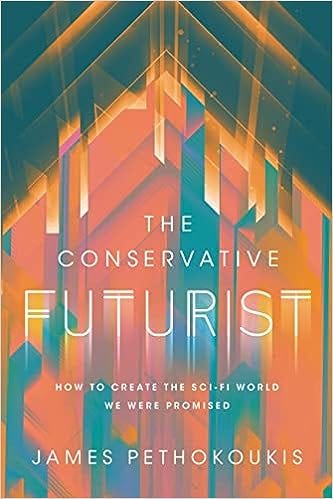☀ The most important pro-progress event of the year (so far) was a tech failure. But that's OK.
The LK-99 superconductor boomlet gave us an aspirational glimpse of a fantastic future
Quote of the Issue
“Men of your day, when they look back into the history of their planet, remark not only the length of time but also the bewildering acceleration of life’s progress. Almost stationary in the earliest period of the earth’s career, in your moment it seems headlong. Mind in you, it is said, not merely stands higher than ever before in respect of percipience, knowledge, insight, delicacy of admiration, and sanity of will, but also it moves upward century by century ever more swiftly.
“What next? Surely, you think, there will come a time when there will be no further heights to conquer. This view is mistaken. You underestimate even the foothills that stand in front of you, and never suspect that far above them, hidden by cloud, rise precipices and snow-fields. The mental and spiritual advances which, in your day, mind in the solar system has still to attempt, are overwhelmingly more complex, more precarious and dangerous, than those which have already been achieved. And though in certain humble respects you have attained full development, the loftier potencies of the spirit in you have not yet even begun to put forth buds.
“Somehow, then, I must help you to feel not only the vastness of time and space, but also the vast diversity of mind’s possible modes. But this I can only hint to you, since so much lies wholly beyond the range of your imagination.” - Olaf Stapledon, Last And First Men
Some self promotion: I have a book coming out on October 3. The Conservative Futurist: How To Create the Sci-Fi World We Were Promised is currently available for pre-order pretty much everywhere. Some folks are already saying nice things about it:
Anyway, I’m very excited about it! Let’s gooooo! 🆙↗⤴📈
The Essay
☀ The most important pro-progress event of the year (so far) was a tech failure. But that's OK.
➡ Super-Short Summary: Though LK-99's promise quickly vanished, its brief emergence sparked some welcome techno-optimism. The speculative superconductor fueled plenty of pro-progress creativity, with enthusiasts envisioning some revolutionary applications. Despite fading like a desert mirage, the (almost) innovation highlighted society's deep desire for big breakthroughs and sparked a renewed optimism about improving life through technology. The visions were thought-provoking, reminding us to maintain hope in human ingenuity despite a long record of stagnation. The excitement generated important conversations about progress, even without a true breakthrough. Not bad at all for a failure.
I just did an interview with Politico about my forthcoming book The Conservative Futurist: How to Create the Sci-Fi World We Were Promised. Among the many questions posed to me: What did I think was the most significant development of the year so far? And while I think I gave a good answer to that question — I will link to the interview when it’s posted — I also now think I could’ve given a better answer.
So, take two: There’s a strong case to be made that the most significant “pro-progress” or “techno-optimist” event of the year happened on July 22 when South Korean scientists published two papers that claimed discovery of a practical superconductor. Then came a video of the supposed superconducting material, LK-99, demonstrating its amazing properties by levitating over a magnet. This Twitter/X posting helped prompt a social media frenzy and is a good example of the enthusiasm of that frenzy:
Kaplan, a 2021 Princeton graduate with a major in physics and currently head of coffee product at frozen coffee startup Cometeer, went on to post/tweet that LK-99, if it proved to be the real deal, would enable a host of other technological advances: lossless electricity transmission, nuclear fusion reactors, quantum computing, super-efficient energy storage, and wider application of MRI machines and MagLev trains. In other words, LK-99 would be a true general-purpose technology, or GPT, that could be used across the American economy with highly significant impact. When combined with the emergence of another possible GPT, generative AI (maybe even leading to AGI), one could imagine the combinatorial impact leading to a flywheel effect where technological and economic momentum would become faster and faster with exponential effects. Let the dreaming begin!
When those first superconductor papers were published on ArXiv, I chatbotted this futurist vignette as William “Neuromancer” Gibson might write it:
Room temp superconductors hit the street. New tech holy grail, the gods toss us a bone. Cities lit up atomically top to bottom now. Compact fusion the new crack, basements rigged into star cores. Gas graves, oil barons, old news.
Supercars. Dead quiet, no friction, slide you cross town in null time. Bullet trains floating on a mirror, making miles a joke. Smoke and mirrors too, netfeeds piping at lightspeed end to end on glass not much thicker than shadows. Processor crunchers mashing big numbers unheard of outside researcher fantasy.
Hospitals jacked with compact donuts that see your guts in wireframes. Electrodes sensitive as spiders watch your ticker, sniff out rads, defects years too early.
Gadgets faster, cooler, hungry as neon. Quantum CPUs unpack the infinities, everyday mysteries.
Atom smashers shrunk to fit college campuses, new physics for all. Cancer patients signing up to get beamed inside Ring accelerators barely bigger than bikes. Juice flows free end to end down glass thinner than air.
Less carbon in the wind than a whisper. Petro kings back to sand and dust. World lit up brighter than Vegas, thinking faster than traders jacked twenty-four-seven. New metals, new science sends us over the event horizon. Singularity maybe. Who knows. For now, we ride higher and faster than any cruise ship hydrocarbon ghost.
And I was hardly the only one creating some Up Wing visions of a world where a startling physics breakthrough meant a substance could transport electricity at room temps with zero resistance. Just how much of Star Trek might actually be possible, some optimists asked? (A possible “yes” to tricorders and warp engines, still a “no” to transporters.) For once, social media was rippling with technological optimism, especially as early action in predictions markets suggested LK-99 might well be legit.
Alas, those hopes proved unfounded by the middle of August with an article in Nature, “LK-99 isn’t a superconductor — how science sleuths solved the mystery,” serving as the final nail in the coffin, including a “game over” quote from Inna Vishik, a condensed-matter experimentalist at the University of California, Davis: "I think things are pretty decisively settled at this point."
(By the way, the Wall Street Journal is reporting that the authors of a different paper claiming the discovery of a room-temperature superconductor have asked Nature to retract it because the lead researcher allegedly misrepresented data. The lead researcher denies wrongdoing and so far refuses to retract the disputed study. The controversial paper made headlines in March by reporting superconductivity in lutetium at 70 degrees Fahrenheit, but outside researchers have been unable to replicate the findings.)
Given all that, why would I pick a failed claim about a practical superconductor breakthrough as my biggest event of the year? Here’s why: Because for a few precious weeks, we were all given a glimpse of a better world, a cooler world, an Up Wing world of the sort our culture has consistently failed to provide. Helped by chatbots and image generators such as Midjourney, my fellow future optimists were able to sketch some wonderful visions of a world where human ingenuity had turned science fiction into science fact. We didn’t need to wait for Hollywood to do it for us.
Indeed, the one upside to LK-99’s brief moment in the sun was that the pessimists really didn’t have enough time to tell us why a room-temp superconductor is, in fact, a VERY BAD thing. Of course, this is exactly what happened with ChatGPT when the thrill of a technological breakthrough was soon doused by Down Wing dystopian doggerel about mass unemployment and robopocalypse. I’m sure that given a few more weeks to collect themselves, the pessimists and catastrophists would have started hammering home the risk of pursuing superconductor technology with nightmare visions of how it could enable hypersonic railguns or how superconductor battery could be turned into a bomb.
Yes, early claims of achieving room-temperature superconductivity were wrong, but they still sparked meaningful conversations about what tech progress could do for us. Even though the science didn’t pan out, all the excitement highlighted how new technologies can improve society. That’s not an insignificant thing when you realize that a widespread spirit of techno-optimism can be pretty helpful for driving innovation forward. (Just think how many technologists have been inspired by the science fiction of Trek.) The speculative ideas around applications of LK-99 were a refreshing change from the constant doom-and-gloom typically surrounding new technologies — an uplifting dose of hope in human ingenuity. That’s not nothing.
With visions of LK-99 floating around my brain, this series of posts/tweets really struck home:
LK-99 was, briefly, a secularly miraculous escape hatch from stagnation. Let’s take inspiration. Let’s go find a real escape hatch. Faster, please!
Micro Reads
▶ Fervo Energy breaks ground on next-generation geothermal plant - Maria Gallucci, Canary Media |
▶ Announcing Helion’s collaboration with Nucor - Helion |
▶ Nuclear Energy Acceptance in Poland: From Societal Attitudes to Effective Policy Strategies — Network Modeling Approach - Pawel Robert Smolinski, Joseph Januszewicz, Barbara Pawlowska, and Jacek Winiarski, ArXiv |
▶ Techno-fixes to climate change aren’t living up to the hype - Justine Calma, Verge |
▶ Limiting Global Warming to 1.5 Degrees C ‘Remains Possible,’ Energy Experts Say - Carlos Anchondo, E&E News |
▶ We try out the first legal level 3 automated driving system in the US - Mark Takahashi, Ars Technica |
▶ Inside the very strange, very expensive race to “de-age” - Whizy Kim, Vox |
▶ The Biden FCC’s Plan to Brake 5G - WSJ |
▶ AI Hurricane Predictions Are Storming the World of Weather Forecasting - Gregory Barber, WIRED |
▶ The Economies Expected to Benefit Most From AI - Tom Hancock, Bloomberg |
▶ Programmable DNA Machines Offer General-Purpose Computing - Charles Q. Choi, IEEE Spectrum |
▶ Generative AI can potentially disrupt labour markets, say Oxford experts 10 years after ground-breaking study - Oxford Martin School |
▶ How China can avoid the Japan trap - Martin Wolf, FT |
▶ China’s economic malaise hits efforts to raise $41bn chip fund - Qianer Liu and Cheng Leng, FT |
▶ Sierra Space Scores Record Funding, Eyes First Commercial Space Station - George Dvorsky, Gizmodo |
▶ 40 years ago today, one man saved us from world-ending nuclear war - Dylan Matthews, Vox |






